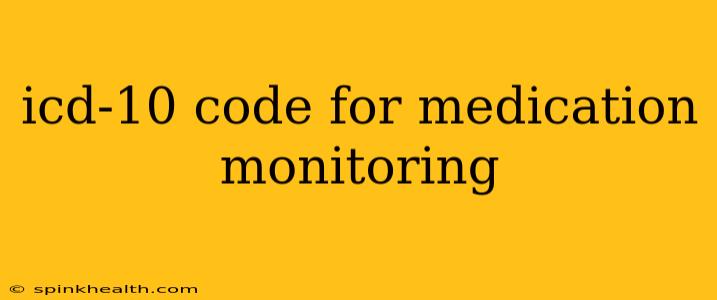The Quest for the ICD-10 Code for Medication Monitoring: A Story of Nuance and Context
Finding the perfect ICD-10 code for medication monitoring feels like searching for a specific grain of sand on a vast beach. There isn't one single code that neatly encapsulates this broad concept. The appropriate code depends heavily on why medication monitoring is necessary and what the patient's underlying condition is. Think of it less like a single answer and more like a detective investigation.
My journey to understanding this started with a conversation with a physician friend. He described the frustrating reality of coding: the need to pinpoint the reason behind the need for monitoring, rather than the act of monitoring itself. This is where the nuance lies.
Let's delve into some common scenarios and explore the potential ICD-10 codes associated with them.
What are the different reasons for needing medication monitoring, and what ICD-10 codes might apply?
This is crucial, as the reason dictates the code. Are we talking about monitoring for:
-
Adverse effects? If medication monitoring is due to a known or suspected adverse reaction, the code would reflect the specific adverse reaction, not the monitoring itself. For example, if a patient is experiencing nausea due to a medication, the code would be related to nausea and vomiting, not the monitoring. This might involve codes from the various chapters related to symptoms, such as those related to gastrointestinal issues.
-
Toxicity? Similar to adverse effects, if the monitoring is for signs of toxicity, the code should reflect the toxic effects themselves and the suspected source (the medication).
-
Therapeutic drug monitoring (TDM)? TDM is often used for medications with a narrow therapeutic index, requiring close monitoring of blood levels to optimize efficacy and minimize toxicity. The code here will depend on the specific condition being treated and may involve codes related to the underlying disease. For example, if TDM is for anticonvulsant medications in a patient with epilepsy, the epilepsy codes would be primary.
-
Medication non-adherence? If the monitoring focuses on a patient’s adherence to their medication regimen, the primary codes would be related to the patient's non-compliance or the resulting complications from non-adherence.
-
Part of routine management of a chronic condition? For example, monitoring blood pressure in a patient with hypertension. The code is then the code for hypertension itself. Medication monitoring isn't coded separately in such cases; it’s assumed as part of the management of the primary condition.
In essence, the ICD-10 code isn't "for medication monitoring" in isolation. It's for the reason behind the need for monitoring.
Isn't there a code specifically for medication management or something similar?
While there isn't a direct code for medication monitoring, there are codes related to medication management, which might be used depending on the clinical context. These generally fall under Z codes, which are used for factors influencing health status and contact with healthcare services. However, even these Z codes would require further specification, aligning with the specific underlying condition or reason for the medication management.
What about Z codes? Can they help in this situation?
Z codes can sometimes be helpful in providing additional context, especially in cases where medication management is a significant part of the encounter. However, they should never be the primary code unless they truly represent the primary reason for the encounter. They function more as supplementary codes than primary diagnostic codes. Again, the specificity of the clinical situation is critical.
How do I ensure I'm using the correct ICD-10 code in my medical practice?
Always consult with a qualified medical coding specialist and your organization's coding guidelines. They can help interpret your specific clinical situations and select the most appropriate ICD-10 codes. Improper coding can lead to serious consequences, including reimbursement issues.
The search for the perfect ICD-10 code for medication monitoring is not a destination but a journey. It's a journey that emphasizes the importance of thorough clinical documentation and understanding the underlying reason for that monitoring. Remember, it's the story behind the monitoring, not the act itself, that dictates the code.

